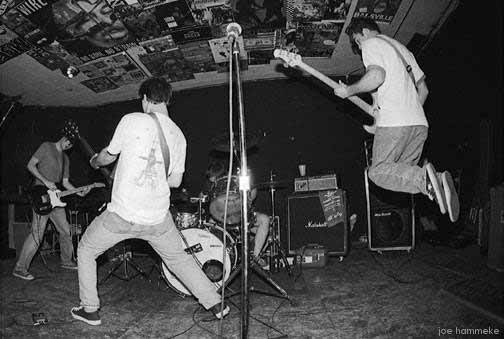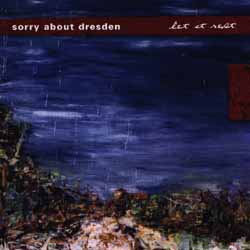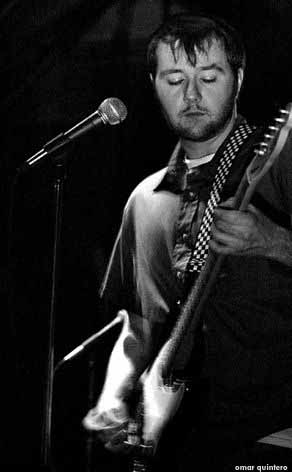|

Sorry
About Dresden: Rooting for the Home Team
story by tim mcmahan
|
|
|
Lazy-i: July 9, 2003
|
Sorry
About Dresden
w / Miracle of '86, 1989 Chicago Cubs
Tuesday, July 15
Sokol Underground
13th & Martha
Omaha
|
|
|
"I don't
think you can ever really escape Omaha, and I mean that both in
a good way and a bad way," says Sorry About Dresden guitarist
/ vocalist Matt Oberst.
Somehow,
the Omaha native has managed to escape the confines of the city
itself, relocating to North Carolina seven years ago, along with
former SAD bassist Matt Tomich (we'll explain the "former"
comment in a minute) to become a teacher as well as part of the
then-burgeoning N.C. music scene.
Oberst says
his Omaha roots influence his approach to music and the business.
"People who leave Omaha still have this home-team ethic going
for them, which is stronger than in any other community," he
said. "When they find out that a band has connections to Omaha,
they just want to help them out."
|
|
|
It
was an Omaha connection that helped draw Tomich and Oberst together.
The two first talked about forming Sorry About Dresden at a January
1997 Commander Venus concert (a band in which Oberst's brother,
Conor, sang lead) in Chapel Hill. Tomich introduced Oberst to drummer
James Hepler and guitarist/vocalist Eric Roehrig, both North Carolina
natives. Six months later, the four played their first gig at a
local club.
So is Tomich's recent
decision to leave the band a shock? Not really, Oberst said. "Matt
turned 30 and decided he'd rather do other things than drive around
in a van and be in the same bar in a different city every night,"
he said. "I'm telling people he's pursuing a solo acting career."
Oberst said Tomich felt
that the timing was right for his departure. With the tour that
brings SAD to Sokol Underground July 15, the band will have finished
crossing the country supporting their most recent release, Let
It Rest. "That means we'll be taking a little time off
to work on new songs," Oberst said. "I don't think we'll
be touring in earnest again until next spring."
Stepping in at bass is
Finn Cohen, an old friend of the band and former guitarist for The
White Octave. "Hopefully he'll want to become a full-fledged
member," Oberst said. "With his songwriting skills, he
would bring a whole lot to the band."
But can anyone ever really
replace Tomich? Oberst says the band lost more than a bass player,
they lost a figurehead. "He's one of those people who knows
someone in every city," Oberst said. "We'd be in a subway
in New York City and someone would walk up to him and say, 'Matt,
is that you?' He's the figurehead that everyone knows, and in that
sense, it's sad that he's leaving."
|

|
"We
take those pretty pop songs and, at times, tear them up. We
destroy what we build."
|
|
|
|

| |
"To
some degree, we'll always be the new band on Saddle Creek
because we're not part of that core Holy Trinity."
|
|
|
With
Let It Rest, Tomich goes out on a high note. Released earlier
this year as the follow-up to their Saddle Creek Records debut,
the CD perfectly melds bone-jarring, over-the-top indie rock with
the band's fist-pumping anthem style. The sound is more-varied than
earlier releases, constantly straddling that fine line between punk
and pop.
"We do 'abrasive'
very well, but we can't do the Sonic Youth 'interesting noise' thing
for very long. That's not our strength as a band." Oberst said.
"You can sit and strum most Sorry About Dresden songs on acoustic
guitar. They have that singer/songwriter structure. We take those
pretty pop songs and, at times, tear them up. We destroy what we
build. I like the freedom of having those sing-along anthems right
along with the quiet songs."
SAD also has the distinction
of being one of the more uplifting acts on a label that has its
share of stark, angry bands. Oberst says he and Roehrig approach
songwriting like putting together a collection of short stories
rather than the more thematic approach taken by bands such as Cursive.
"My perspective
is very skewed," he said. "The first band I was in was
with Tim Kasher and Matt Maginn. I grew up with Conor and listening
to Norman Bailer which became The Faint. I've watched as all the
bands on the label have sort of grown into their voice. They are
coming into their own to do what they do very well."
He said being lumped
in with such a group of high-quality song writers is a distinct
advantage. "Being on Saddle Creek, you can call up a club and
they will book you immediately. It's great," he said. "To
some degree, we'll always be the new band on Saddle Creek because
we're not part of that core Holy Trinity. In that sense, people's
opinions of us are stronger one way or another than they would be
if we were on a different label. There's a set of preconceptions
people have about you due to the label and who you are. You're constantly
asked if you've lived up to your potential."
But maybe the biggest
advantage to being on Saddle Creek, Oberst said, is working with
people you know and trust. "We have a record label we can call
up and deal with as friends, not some monolithic organization,"
he said. "It's nice to be part of that family."
Back to 
Copyright © 2003 Tim McMahan. All rights reserved.
|
|
| |
|
|
|
